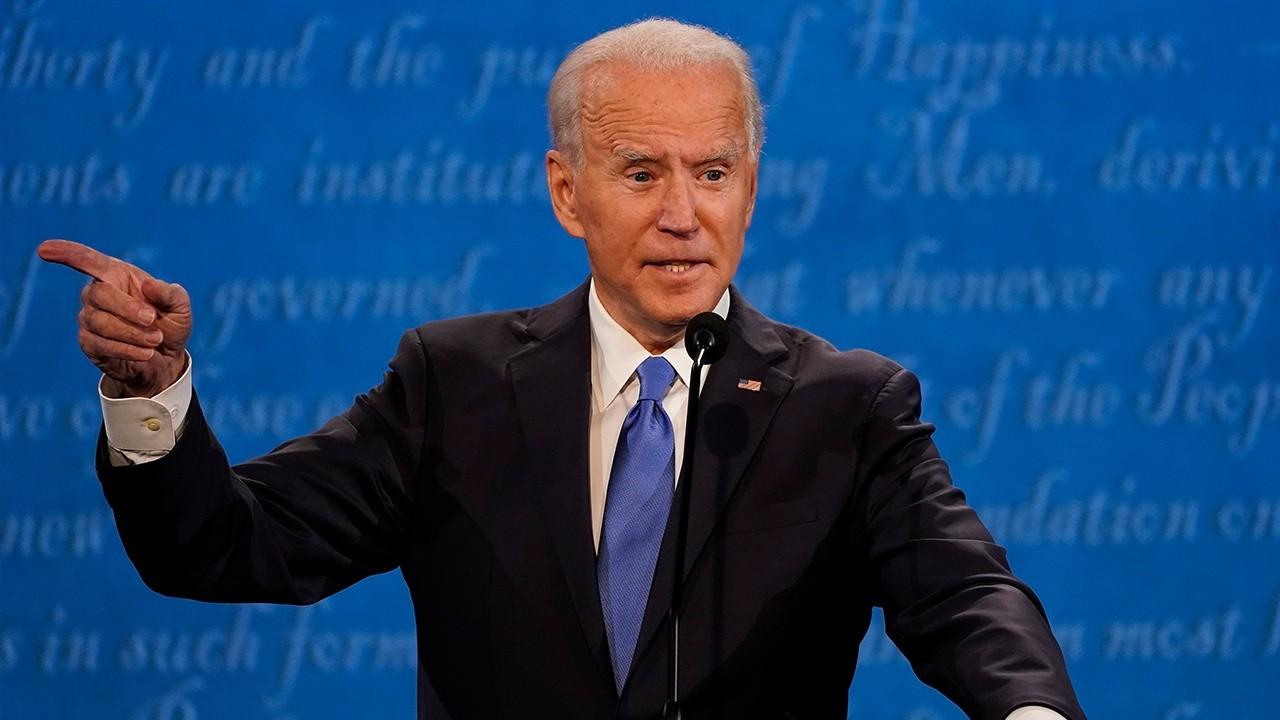If Biden wins, he tells his Wall Street supporters he can’t wait to raise taxes
Biden believes increasing taxes is a 'moral issue' and the best way to begin minimizing the wealth inequality in America
The polls may be tightening as the 2020 presidential election is just over a week away, but Democratic nominee Joe Biden and his top advisers are already laying out an aggressive economic agenda that would make raising taxes their top and immediate priority if the former vice president is elected, FOX Business has learned.
Biden continues to tell Wall Street supporters his sweeping plan for tax increases on wealthy individuals and corporations will likely be introduced as legislation almost immediately upon taking office despite the nation’s pandemic-induced economic slowdown, people familiar with Biden’s campaign strategy tell FOX Business.
VOTERS IN 17 STATES WILL SEE TAX QUESTIONS ON BALLOTS
Biden advisers are counting on a blue wave to usher him into the White House — along with a Democratic Senate that will help them get their tax increases passed quickly and without compromise.
Much of the urgency stems from the need to raise revenue to pass Biden’s signature legislation — the $2 trillion infrastructure package that focuses on clean energy and that would be implemented over Biden’s first term, these people say. This spending package is the sine qua non of his campaign promise to jumpstart the economy hampered now by the coronavirus pandemic as well as address some climate concerns of Democratic voters.
People close to Biden say his urgency to pass tax increases is also guided by other forces. As FOX Business has previously reported, Biden believes increasing taxes is a "moral issue" and the best way to begin minimizing the wealth inequality in America that he believes has been exacerbated by the Trump administration’s rollback on taxes.
And from a practical standpoint: Biden is likely to face a debt ceiling debate in July, which means he’ll need to outline a viable budget with some way to pay for his proposals not long after taking office in January, if he is elected.
Some economists, however, say the move to increase taxes during a recession is risky. After taking office following the 2008 financial crisis, former President Barack Obama and then-vice president Biden put off tax increases until the economy began to recover, fearing a prolonged recession if businesses and entrepreneurs were saddled with high costs, and wealthy individuals cut back on their consumer spending.
Wall Street executives close to Biden say he has no qualms about tax increases this time around because he has been heartened by some reports, including from Goldman Sachs, that his spending plans on infrastructure and other items will offset the negative economic impact of higher taxes.
These executives also say that Biden also plans to implement all tax changes retroactively, and he will use a legislative tool known as "budget reconciliation" to speed the process so he needs just 51 votes in the Senate.
ELECTION DAY PREPARATIONS: RETAILERS, BUSINESS OWNERS BRACING FOR POTENTIAL UNREST, OFFICIALS SAY
Of course, much depends on the election. Following last week’s strong debate performance, incumbent Republican Donald Trump improved his standing in battleground state polls, shaving points off Biden’s lead. Then there’s the ultimate makeup of the Senate; there are signs that vulnerable GOP seats may remain Republican as polls tighten in the final days leading up to the election.
But if Democrats run the table by winning the presidency, keeping the House and taking over the Senate, tax increases are on the way, and fast, Wall Street executives close to Biden say.
According to a memo obtained by FOX Business from an investment firm with ties to the Biden campaign, corporate tax increases would rise to 28% from 21% (they would fall short of the Obama-era rate of 35%). Other aspects of Biden's corporate tax plan include:
- Taxing the foreign earnings of American companies at a rate of 21% compared to 10% under Trump.
- Book income (the amount of money companies report they made on public financial statements, often different than the number they filed in their taxes) will be taxed at 15%.
- The elimination of a tax advantage for private equity firms – known as the carried interest deduction – by increasing long-term capital gains for millionaires.
GET FOX BUSINESS ON THE GO BY CLICKING HERE
On the personal income side, Biden has pledged not to raise taxes on people making less than $400,000, though his plan doesn't recognize that small businesses file as individuals and they would get hit with higher tax rates (the top bracket rising to 39.6% from 37%) and other levies even as they're struggling to survive an economy still hampered by the coronavirus pandemic. The Biden plan also doesn't account for business passing the costs of higher taxes to consumers through higher prices and workers through lower wages.
Other aspects of the Biden tax plan as it impacts individuals include:
- Increasing capital gains and dividends; under Biden, individuals will pay the same tax rate on capital gains—money they make from investments—as they would on their salaries (factoring in filing status and amount of income). Generally, the rate for taxing capital gains is lower than the rate someone may pay on their salary.
- The inheritance tax would increase from 40% to 45%.
- The threshold for inheritance taxable income would also be lowered to around $5 million compared to $11.5 million.
A Biden spokesman did not respond to a request for comment.




















